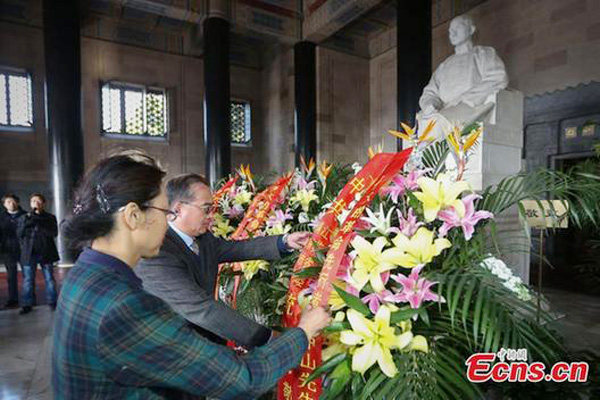 |
|
People pay tribute to Sun Yat-sen (1866-1925) at Dr Sun Yat-sen's Mausoleum to mark the 90th anniversary of his death in Nanjing, capital city of East China's Jiangsu province on March 12, 2015. [Photo by Yang Bo/Ecns.cn] |
Nov 12, 2016, will be a day of grand celebrations, for it marks the 150th birthday of Sun Yat-sen (1866-1925), "a great national hero, patriot and the front-runner of China's democratic revolution". The decision to celebrate the occasion came just a day after the historic meeting between Xi Jinping and Ma Ying-jeou in Singapore on Saturday, a milestone in cross-Straits relations.
Events will be held to honor Sun's contribution to national independence, social advancement and people's welfare, carry forward his patriotic thoughts and revolutionary and entrepreneurial spirit, in the hope of safeguarding cross-Straits peace and enhancing the Chinese cohesion, says a statement released after the plenary meeting of the National Committee of the Chinese People's Political Consultative Conference on Sunday.
Next year's high-profile commemoration of Sun should not come as a surprise, because such events were held in 1996 to mark his 130th birthday and 2006 for the 140th birthday. Routine as it is, the commemoration will be of special significance to both sides of the Straits, which still express similar gratitude and honor to possibly the least controversial figure in Chinese modern history.
For starters, as the founding father of the Republic of China and the Kuomintang, Sun led the historic Revolution of 1911 ending the feudal monarchy which had existed in the country for more than 2,000 years. This irrefutable fact cuts across all parties' ideologies and beliefs.
In particular, Sun played a vital role in pushing for the first cooperation (1924-1927) between the Kuomintang and the Communist Party of China, which helped boost the KMT-led Northern Expedition (1926-1928) that ended the rule of the Beiyang government and local warlords in the north.
To a point, it is fair to say the Northern Expedition set a precedent of cooperation for both parties, incubating the Second CPC-KMT Cooperation which started from 1937 and led to the hard-won victory of the Chinese People's War of Resistance against Japanese Aggression (1937-45).
Sun's lifelong search for a cure for the ills of his homeland, which was still suffering from Western imperialist attacks from outside and warlords' rule at home when he died in 1925, culminated in the "Three Principles of the People" - Nationalism, Democracy and People's Livelihood - especially the 1924 revised version. It has a lot in common with the Chinese Dream, a far-sighted concept proposed by President Xi Jinping three years ago, in terms of ultimate goals.
Sun's Three Principles focused on the overall equality of all ethnicities at home and independence in the international community, as well as people's well-being and right to participate in politics, while the Chinese Dream is aimed at "achieving national prosperity, rejuvenation and happiness for the Chinese people". Sun's grand industrial plan of nationwide construction of railways, roads and harbors, too, is being realized at great speed in today's China.
It is foreseeable that the academic exchanges between the mainland and Taiwan, especially on Sun's contributions to the country, will increase. With more in-depth materials discovered and insightful discussions inspired, people are likely to get a more objective and comprehensive understanding of the pioneer of democracy in China.
The author is director of and a senior researcher at the Institute of Modern History Studies, Chinese Academy of Social Sciences. The article is an excerpt of his interview with China Daily's Cui Shoufeng.

I’ve lived in China for quite a considerable time including my graduate school years, travelled and worked in a few cities and still choose my destination taking into consideration the density of smog or PM2.5 particulate matter in the region.